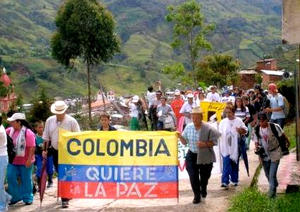Peace in Colombia is in a precarious position—says the literature on post-conflict countries. A 2003 World Bank report states that on average, 44% of countries emerging from civil war return to conflict within the first five years, as the conditions that breed civil war often remain after the peace process has taken place.
In Colombia, the key to ending the conflict in a lasting way is to introduce economic policies that will increase economic growth for all, thereby creating incentives to keep the peace. But designing economic policies without the capacity for implementation in effect actually incentivizes violence. So what are the solutions and challenges in the Colombian context?
 The notion of the “peace dividend” is a useful way to conceive of post-conflict economic policies. The peace dividend is the amount of money, resources, and social capital that a country can potentially save and redistribute when its civil war is settled and its war economy dismantled. In Colombia, the current defense budget is almost 6% of the GDP. Reducing this budget would be the only way to benefit from a peace dividend—but even with the civil war over, it seems unlikely the Santos government would do so.*
The notion of the “peace dividend” is a useful way to conceive of post-conflict economic policies. The peace dividend is the amount of money, resources, and social capital that a country can potentially save and redistribute when its civil war is settled and its war economy dismantled. In Colombia, the current defense budget is almost 6% of the GDP. Reducing this budget would be the only way to benefit from a peace dividend—but even with the civil war over, it seems unlikely the Santos government would do so.*
As of late January, the lead government negotiator for the peace talks, Humberto de la Calle, emphasized that the military budget is not subject to negotiation with the rebels, and affirmed that the defense budget would not be reduced in case a peace agreement is reached. Though De la Calle's stance might be seen as political posturing for former President Uribe, who has accused Santos of selling out the country to the FARC, it is more likely an agreement Santos reached with his generals that their purse, planned expansion, and privileges would not be touched in the eventuality of a peace accord.
With no plans to ensure that the end to the civil war materializes in a strong peace dividend, Colombia faces a climate of hampered economic growth. And while the maintenance of an elevated defense budget is often justified by the claim that it deters further recurrences of conflict, it is in fact likely to send the message to the rebels that while they disarm, the military will continue their armament spiral.
Colombia’s bloody history of massive extermination of political opposition by state agents and their paramilitaries is no more promising for peace. In the 1980s, more than 3000 members of the Patriot Union (UP), a leftist coalition including the Communist Party, independents, and rebel sympathizers, were murdered. The UP was founded during the peace negotiation initiated by Belisario Betancur’s government (1982-6).
And during the last two last years, 30 members of the leftist movement Marcha Patriotica were killed by state agents and their associates.
Given the tarnished history of the security-military complex in Colombia, it is unclear whether the Santos government or any subsequent government could guarantee the rights of any meaningful leftist opposition—one of the five accorded points of the peace talks.
Beyond coordinated, armed opposition, one of the most frequent threats to post-conflict situations is the rampant spread of criminal violence. As evidenced in Guatemala and El Salvador, criminal violence can cost as much as the civil war itself: in 2004, criminal violence in El Salvador cost 11% the GDP, and in 2005, in Guatemala, it cost around 8% the GDP. In order to avert the continuation of the civil war by criminal means, economic growth and distributive policies are crucial.
With the deep entrenchment of the private armies of narcotraffickers, death squads, gangs, and paramilitaries, punctuated by a compromised state apparatus, Colombia must strategize how to avoid the criminalization of its post-conflict stage. It must focus instead on growth, employment, and distributive social policies, or else succumb to the biggest challenge facing the peace talks and their eventual resolve: the lack of guarantees and incentives of the implementation of the accords.
* The latest scandal of the military intelligence spying on the government's negotiators in Cuba reveals the level of distrust between sectors of the military and the President inspite of all assurances. This spying episode raises the specter of threat to any effort to reduce the military privileges and budget. See also http://anncol.eu/index.php/anncol-debate/5959-andromeda-parainteligencia...
Nazih Richani is Associate Professor of political science and Director of Latin American studies at Kean University in Union, New Jersey. He is the author of Dilemmas of Political Parties in Sectarian Societies: The Case of the PSP of Lebanon (St. Martin’s Press, 1998) and System of Violence: The Political Economy of War and Peace in Colombia (State University of New York Press, 2002). He blogs at "Caudernos Colombianos."

